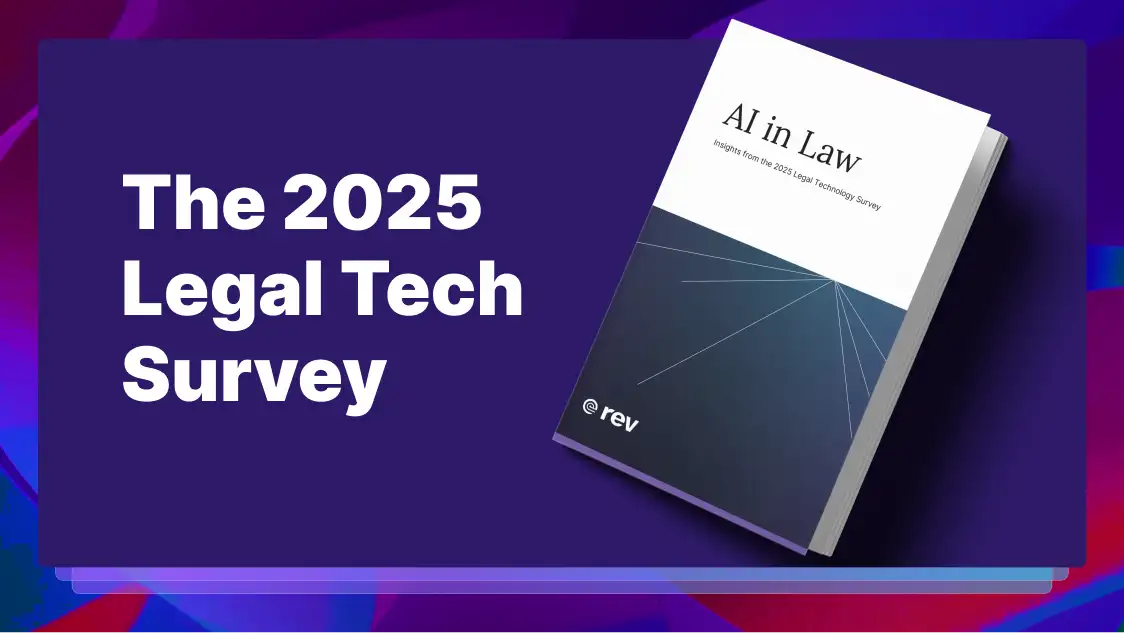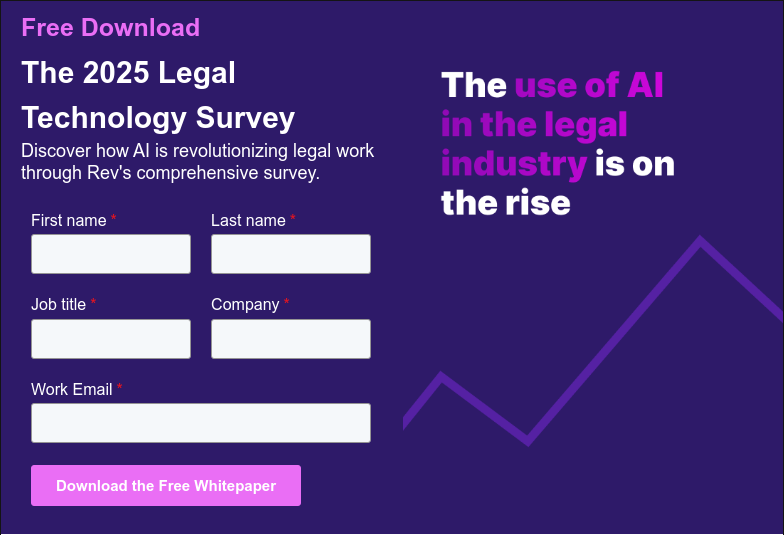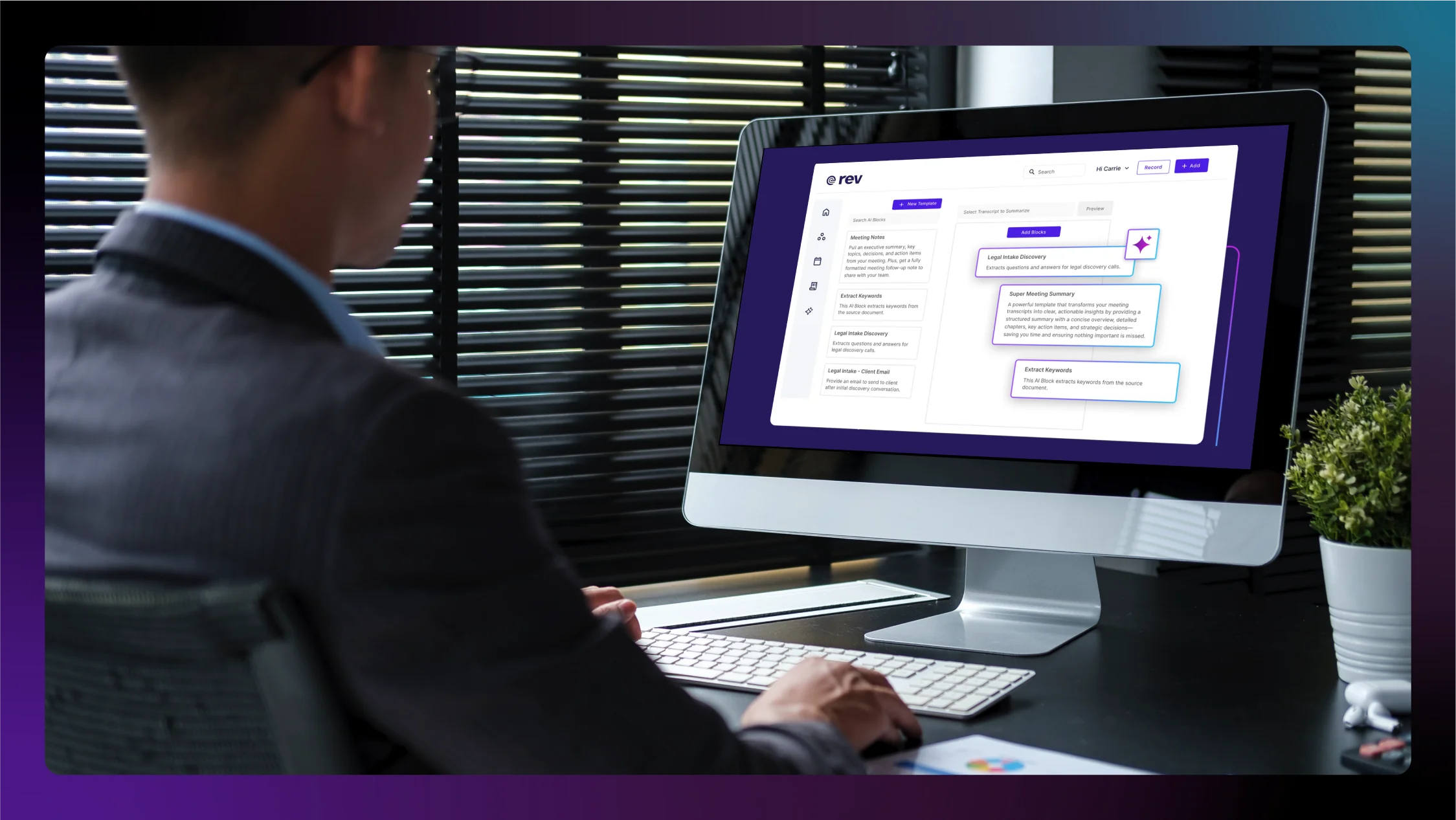The 2025 Legal Tech Survey
Discover key insights from Rev's comprehensive 2025 Legal AI Survey revealing how the profession is embracing AI.

Rev's comprehensive 2025 Legal Tech Survey offers an unparalleled look into how AI is transforming the legal profession right now.
Based on responses from legal professionals across diverse roles and firm sizes, our research captures the real-world adoption patterns, challenges, and strategic priorities driving the integration of AI into legal practice. From productivity gains and ROI measurements to specific use cases and implementation concerns, this report provides actionable insights for law firms navigating technological change.
Whether you're just starting your AI journey or looking to optimize existing technologies, the data and analysis in this survey will help guide your strategic decisions in this rapidly evolving landscape.
Key Insights from Rev's Comprehensive Legal AI Survey
Our extensive survey captured insights from legal professionals across the spectrum—from solo practitioners to large firms, from paralegals to managing partners. What emerged is a clear picture of an industry actively embracing AI while thoughtfully navigating its challenges and limitations.
The Numbers Don't Lie: AI Is Here

While lawyers have historically approached new technologies with caution, the data reveals a dramatic shift in attitude and adoption. An impressive 51% of legal professionals now recognize AI as the single most transformative force for their industry over the next half-decade—and they're not just talking about future possibilities.
Nearly half of all lawyers surveyed (48%) have already incorporated AI-powered legal research into their daily practice, demonstrating that this isn't merely speculative enthusiasm but practical, on-the-ground implementation. These early adopters aren't waiting for the perfect solution; they're gaining valuable experience now that will position them ahead of competitors still hesitating on the sidelines.
The revolution isn't coming. It isn't something to prepare for in the abstract future. It's unfolding in law offices across the country right now, reshaping how legal professionals work, research, and serve their clients.
What Legal Professionals Are Actually Using AI For

Despite fears that AI might replace human judgment in legal practice, our comprehensive survey reveals a much more nuanced reality. Rather than wholesale replacement, lawyers are strategically deploying AI as a precision tool that amplifies their existing expertise and judgment.
The data shows three primary areas where legal professionals are finding immediate value:
- 42.4% use AI-powered legal research: Rather than spending hours manually combing through case law, lawyers are using AI to quickly surface relevant precedents, allowing them to spend more time on sophisticated analysis and argument development.
- 35.6% employ contract review AI: This technology identifies potential issues and inconsistencies in draft agreements, providing a valuable first-pass review that human lawyers then refine with their expertise.
- 22.1% utilize AI-powered transcription: Accurately capturing every word in depositions, client meetings, and court proceedings without the distraction of note-taking is just one of the many benefits of legal transcription.
What's most striking is how these adoption patterns reflect a thoughtful integration of AI into existing workflows. Lawyers aren't surrendering their professional judgment to algorithms; they're deliberatively selecting technologies that free them from routine tasks while preserving their irreplaceable expertise for the aspects of legal practice that truly require human wisdom.
Speech Tech: The AI Tool Lawyers Need Most
Within the broader landscape of legal AI adoption, speech technology has emerged as a particularly significant tool for attorneys seeking to modernize their practice. As complex cases generate hours of critical conversations—from witness interviews to strategy sessions—the ability to accurately capture, transcribe, and analyze spoken content has become increasingly essential.
The Shocking Inefficiency of Manual Notes
Consider this startling comparison: At absolute best, traditional handwritten notes capture merely 20% of the content in a legal conversation. Critical nuances, exact phrasing, and vital context are inevitably lost. By contrast, AI-powered recording and transcription captures at least 95% of every word spoken, creating a comprehensive and searchable record that can be referenced with confidence.

Our survey data reveals a clear prioritization among legal professionals for what they most want to automate:
- Transcribing meetings and notes topped the list by a significant margin, reflecting the enormous time sink that manual documentation represents.
- Organizing case materials ranked second, as lawyers struggle with the volume of documents in modern litigation.
- Searching through case files to quickly locate specific information was the third most cited need.
These priorities reflect a profession drowning in administrative work that technology is perfectly positioned to address. By automating these tasks, lawyers can redirect their attention to the strategic, analytical work they were actually trained to do—formulating legal strategy, counseling clients, and crafting compelling arguments.
The ROI Is Real

The business case for AI adoption in legal practice has moved beyond theoretical to quantifiable. According to Thomson Reuters' authoritative 2024 Future of Professionals Report, the productivity gains from AI implementation will be transformative within just five years:
- 12 hours per week reclaimed from administrative tasks (amounting to 624 hours annually)—that's a full three months of standard workdays recovered each year.
- $300,000 in new billable time generated per lawyer annually—a figure that would dramatically impact firm profitability.
These aren't speculative projections but calculated estimates based on current AI capabilities and observed efficiency improvements. For a mid-sized firm with 20 attorneys, the potential revenue impact approaches $6 million annually—numbers that transform AI from a "nice-to-have" technology into a business imperative.
What makes these figures particularly compelling is their focus not just on cost reduction but on value creation. AI isn't merely helping lawyers work more efficiently with existing clients; it's expanding their capacity to serve more clients and tackle more complex matters without increasing headcount.
Balancing Innovation With Professional Standards
The legal profession's cautious approach to technology isn't simply resistance to change—it reflects a deep commitment to ethical obligations and professional standards that have defined the practice of law for centuries. Our survey reveals the tension between rapid technological change and these enduring values.
A concerning 60% of firms currently lack specific AI usage guidelines, leaving individual attorneys to navigate complex ethical considerations without institutional guidance. This governance gap creates significant risk, especially considering that client confidentiality consistently ranks as the #1 concern regarding voice recording technologies.
Legal professionals are rightly concerned about several overlapping issues:
- How client conversations are captured and stored.
- Who might have access to sensitive information.
- Whether AI systems might inadvertently "learn from" confidential data.
- The potential discovery implications of creating permanent records.
Despite these concerns, the profession isn't rejecting technology—it's seeking responsible implementation pathways. Forward-thinking firms are establishing clear protocols around consent, data security, and appropriate use cases, demonstrating that innovation and ethical practice can coexist with thoughtful governance. Learn more about how law firms are integrating tech with our lawyer statistics post.
Where Your Firm Should Focus Right Now

Looking at where legal professionals see the greatest need for technological improvement provides a roadmap for strategic investment. Our survey identified clear priorities:
- Document Management and e-Discovery (26.4%): The exponential growth in electronic evidence has created urgent needs for better tools to organize, search, and analyze vast document collections.
- Deposition and Transcript Management (20.7%): The ability to efficiently capture, search, and leverage testimony emerges as a critical competitive advantage, especially in litigation-heavy practices.
- Client Intake and Matter Management (13.8%): Streamlining the onboarding process and matter tracking allows firms to serve more clients with greater efficiency.
What's particularly notable is how closely these priorities align with speech technology capabilities. The top two areas—representing nearly half of all responses—directly involve the capture, transcription, and organization of spoken information. This convergence suggests that investments in advanced speech technologies will deliver outsized returns by addressing the profession's most pressing needs.
Firms that strategically invest in these priority areas stand to gain significant advantages in efficiency, client service, and, ultimately, profitability.
Download the Full Report
Get the complete "AI in Law: Insights from the 2025 Legal Technology Survey" to discover:
- Detailed analysis of AI adoption patterns across firm sizes
- Best practices for implementing speech technology securely
- How leading firms are measuring ROI from AI investments
- The specific tools being used by forward-thinking legal teams
Produced by Rev, the leader in AI-powered speech-to-text technology trusted by top law firms nationwide
















